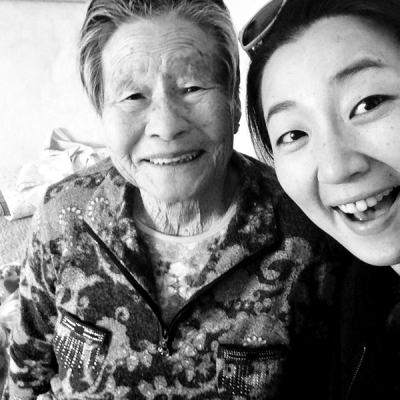| |
 |
|
| ▲ Sinji Jung (right) has devoted her time to recording the tales of Jeju's senior citizens. Photo by World Culture Open. |
A desire to find the extraordinary stories within ordinary people’s lives could be described as being the driving force behind Jeju islander Sinji Jung’s work.
From an early age, a curiosity about everyday lives has motivated the writer, photographer and interviewer’s pursuits.
At just 15-years-old Sinji left home to learn something of the world around her before embarking on 10 years’ study at university.
After roaming the world and completing a PhD in cultural anthropology, she returned to Jeju in 2012 where she began interviewing halmang - the island’s grandmothers - and recording their often fascinating insights into the province’s past.
Among the many interviews she conducted with the island’s grannies, one story has been more prevalent than most – that of those who lost loved ones.
She said: “When I returned to Korea, I realized that there aren’t many people who record the ordinary people’s voice and do archiving – especially in Jeju where one whole generation experienced tragedy.
“The direction of history afterwards is decided on how many professionals listen to the voices with variety. It sounds bombastic but my motto is to live life based on what I’ve learned.”
Her interest in archiving the stories of Jeju’s elderly folk can perhaps be traced back to a break-up in a relationship.
The separation left her at a loose-end in her life, but in order to pull herself from her sadness she devoted herself to another passion - the island where she grew up. Inspired by her own sense of loss, she began taking photographs of discarded homes and deserted landscapes around Jeju, spurring her curiosity about the stories connected to the images.
She said: “I imagined about people who used to live in the abandoned houses and became interested. I imagined and got to know about people’s gender, age and even personalities from the traces.
“Sometimes, I confronted happy scenes but I couldn’t help but face sad scenes in life and even inside of me from the pictures.”
This led to the first of her interviews with Jeju halmang, many of whom live alone and had lost loved ones in the April 3 uprising of 1948 or in the Korean war of 1950-53.
She said: “So to speak, the sorrow of break-up motivated me to start. So I decided to listened to the stories of grandmas on a regular basis.
“I realized break-up, of course, was not an easy thing but compared to the sorrow that [some of] the grandmas have, it was a small thing. As I spoke with the grandmas, I felt my sorrow faded out.”
She added: “They have never wished for anything in their lives but at the same time nothing went well with their hopes.
“They surrendered themselves to their lives. On top of that, they have gone through pains and grief that I couldn’t dare to imagine. In spite of this, they live their life with strength.”
| |
 |
|
| ▲ Jeju's halmang live life with strength, says Sinji Jung. Photo by World Culture Open. |
Sinji has since interviewed Jeju’s grannies at least once a week over recent years. She says the scores of archived stories she has gathered should be seen as historically important documents of island life.
She says it is her passion for her subject matter which keeps her coming back for more.
And, while it means her travels these days are often limited to Jeju, she says her island inteviews have taken her on a new type of journey, albeit one firmly rooted within the province.
She added: “I have never thought of Jeju as boring. I think that is because I can see grandmas and grandpas everywhere. I feel I am travelling time not places, so I meet each individual’s world.”
But it is not just a fascination for her subject matter that keeps her coming back for more.
It is important for us all to take time to listen to the stories told by our elders in a time when dramatic change is sweeping through Jeju, says Sinji.
“We need to understand about the times that grandparents have lived through and we have to listen to them carefully.”
She added: “Unless we know about our grandparent’s time, the Jeju of 50 years later and even our future doesn’t exist,” she said.
Despite already recording hundreds of hours of interview, she says she will continue her seemingly tireless pursuit with the aim of helping Jeju’s residents gain a deeper understanding of the island’s people and the society in which we live.
She said: “I sometimes ask myself the question ‘what should I do today if the world ends tomorrow? My answer for that question is to save Jeju’s story as much as possible, even if it might be forgotten.”
|





















